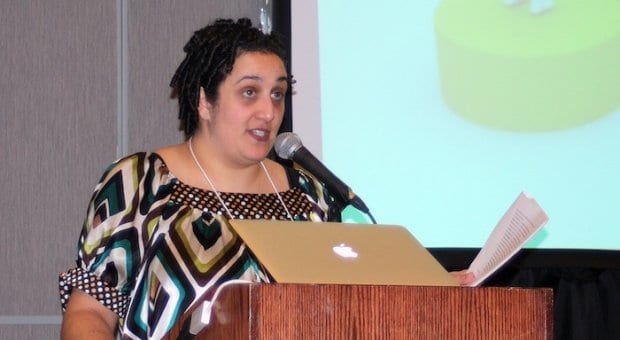The biennial Rainbow Health Ontario (RHO) conference on LGBT health and wellness wrapped up Feb 7 in Toronto, concluding three days of presentations and workshops with topics ranging from fat phobia and sex education to barebacking and making sports more LGBT-inclusive.
Planned Parenthood Toronto’s David Udayasekaran and Carly Boyce shared the pilot run results of Queering Sex Ed, a program engaging LGBT youth in creating more inclusive sex-ed resources.
“As of this year, the sex-ed curriculum in Ontario is 20 years old, so it has no mention of anything that has to do with the internet or to do with texting, or actually — and this is what I find most disturbing — consent,” said Udayasekaran. In the revised edition online, the words “gay” and “transgendered” appear only in the glossary.
While no time line has been announced for developing an updated physical health and education curriculum or reviving the shelved LGBT-inclusive curriculum of 2010, Boyce is hopeful that these more inclusive resources will circulate through other channels, noting that youth are most likely to seek out information from their peers and the internet anyway.
Therapists LeeAndra Miller and and Jordan Elsey shared their work as co-facilitators of the Trans Partner Network in Toronto, a Sherbourne Health Centre program that offers support to the partners of trans, gender-variant and genderqueer people.
Miller explained that the program was launched largely in response to trans youth who felt isolated and anxious they would never find partners.
“‘Will anyone ever love me?’” Miller recalled being asked time and again. “It was heartbreaking that we didn’t have this incredible presence of partners in our community to say, ‘There’s lots of people that are going to love you, of course.’”
The program’s participants, however, are not trans, and new members often express concern that they’re stealing the spotlight from their trans partners or that seeking support will make their partners feel like a burden. In response, Miller and Elsey emphasize that transphobia, not the trans partner, is the problem and that by supporting cisgender partners, they are ultimately helping trans people receive more love and support in their relationships.
Marking a relatively new area of focus for RHO, the organization invited May Friedman, assistant professor of social work at Ryerson University, and Sabrina Friedman, a New York City social worker, to discuss the healthcare implications of fat phobia and untangle some of the more widely held assumptions about body size and health.
“Studies have shown that fat kids experience ostracism from nursery all the way through college,” Sabrina Friedman said. “They develop low self-esteem and are discouraged by educational professionals from pursuing their dreams or their goals . . . Colleges are less likely to admit equally qualified fat applicants.” These youth are at greater risk of depression, disordered eating and suicide, she said.
Challenging the idea that fat bodies are inherently unhealthy, May Friedman suggested that the mental and physical impacts of stigmatization, social isolation and “yo-yo dieting,” compounded by a tendency to avoid healthcare for fear of shaming, could be the true causes of poor health outcomes, rather than fat bodies themselves.
She further pointed to research showing superior health outcomes in fat versus thin people with respect to certain conditions, including greater survival rates with some serious illnesses, including kidney disease. “This is so impossible for people to believe in this era of common sense understanding of ‘fat is unhealthy’ that even when researchers find this, they refer to it as ‘a reverse epidemiological phenomenon,’” she said. “They see it as a paradox when they see that fat equals survival because they’ve been so attuned to the idea that fat equals disease.”
RHO will be releasing a series of fact sheets about the intersection of fat phobia, LGBT identities and health in its next newsletter.
The conference was sponsored by the Canadian Cancer Society, the Office of Francophone Affairs, the Association of Ontario Health Centres, and UFCW locals 175 and 633.

 Why you can trust Xtra
Why you can trust Xtra


